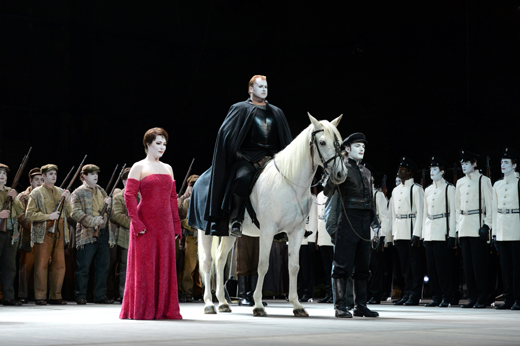 France R. Wagner, Rienzi: Soloists Capitole National Orchestra, Capitole Chorus & Chorus from the Teatro alla scala Academy, Pinchas Steinberg (conductor), Theâtre du Capitole, Toulouse, 7.10.2012 (JMI)
France R. Wagner, Rienzi: Soloists Capitole National Orchestra, Capitole Chorus & Chorus from the Teatro alla scala Academy, Pinchas Steinberg (conductor), Theâtre du Capitole, Toulouse, 7.10.2012 (JMI)
New Production
Direction: Jorge Lavelli
Sets: Ricardo Sánchez Cuerda
Costumes: Francesco Zitto
Lighting: Jorge Lavelli & Roberto Traferri
Cast:
Rienzi: Torsten Kerl
Irene: Marika Schönberg
Adriano: Daniela Sindram
Colonna: Richard Wiegold
Orsini: Stefan Heidemann
Cardinal Orvieto: Robert Bork
Baroncelli: Marc Heller
Cecco del Vecchio: Leonardo Neiva
Peace Messenger: Jennifer O’Loughlin

Much like with Boris Godunov (S&H review here), the first order of reviewing Wagner’s Rienzi consists of establishing which version is being performed. Unlike with Boris, there is technically only one version of Rienzi, since the original score, of which no copies exist, was lost in Hitler’s bunker. But there are numerous different cuts to consider, apart from those that Wagner made for the Dresden performances—the orchestral parts of which are the basis for any score produced these days.
The difference can be vast: Between Edward Downes’s version from 1967 and the one offered in Berlin two years ago, there are over two hours of music difference: present in the Downes, missing from the Berlin version. I’m torn between siding with the defenders of the more integral versions, and realizing that Rienzi has a real need for major cuts. Wagner’s libretto, for starters, has little dramatic power to it: There simply isn’t enough happening during the first three acts. But then the score has its moments of interest, even if it isn’t the opera I should take with me to the desert island. Toulouse’s Capitole struck a balance and offered a Rienzi with almost three net hours of music.
  R.Wagner, Rienzi, S.Lang-Lessing / Deutsche Oper Berlin T.Kerl, K.Aldrich, C.Nylund et al. Director: Philipp Stölzl Arthaus Musik DVD & Blu-ray     |
Toulouse’s Rienzi is directed by Jorge Lavelli, whose work is characterized by minimalism and timeless action. During the first half of the opera the stage is enclosed by metal walls, opening in the second half to show a larger space behind them. Just a few props help to the development of the action: a platform for the failed murder of Rienzi, a beautiful (real) white horse on which Rienzi rides, and a raised podium for Rienzi to ie at the hands of the people. The costumes are timeless and nicely contrasting the different protagonists: priests, military, and common people.
The choirs is treated as a single character, always moving as one. Jorge Lavelli narrates the story with clarity, giving great attention to the role of the Church, the true protagonist in what might be called The Rise and Fall of Rienzi. Overall, Philipp Stölzl’s Berlin production that identifies Rienzi as Hitler seems more interesting, though.
Pinchas Steinberg is a frequent conductor in Toulouse and I’ve enjoyed his musical performances during the last ten years. His performances of operas by Wagner and Richard Strauss have always been excellent. His reading of Rienzi, too, was full of energy and vitality, well suited to what this music needs. He got a great performance from the Capitole’s orchestra, which is the best in some 400 miles around. The Choirs were also excellent in a very demanding opera for them.
The character of Rienzi has lots to sing and an uncomfortable tessitura—not the stuff many tenors eagerly seek out. That has left Torsten Kerl to become the reference to the role, who also sang in the above mentioned performance in Berlin. He was excellent all along and it can be considered a luxury to have him as Rienzi in Toulouse. The Swedish soprano Marika Schönberg was Irene, Rienzi’s sister, and her stage performance was better than her singing. Her vocal range is wide enough, but her singing is quite uncontrolled, always inclined to forte and fortissimo, and with a top register uncomfortably close to screaming.
Adriano Colonna is the more thankful character in this opera, and Wagner gave to him/her plenty moments to shine. Daniela Sindram sang with conviction and control in a remarkable performance. The other characters were properly covered. Among them I should mention Robert Bork as Cardinal Orvieto and the excellent Jennifer O’Loughlin as the Messenger of Peace.
José MªIrurzun